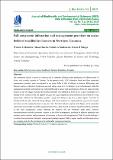| dc.description.abstract | Fall armyworm (FAW) is native to America and is currently affecting maize production in different parts of Africa, and recently reported in Tanzania. In the present study, FAW infestation levels and their associated management practices were investigated in 90 maize fields in the 18 villages in Arusha, Kilimanjaro and Manyara regions. Infestation levels were assessed using a scale of 0 (no damage) to 9 (100% damage), while the management practices information was collected through a survey and questionnaires from 210 maize growing farmers in the 18 villages. Results showed that all fields were infested by FAW at low (1-4) to moderate (5-7) damage levels. Arusha scored the highest (66.59% and 5.422) significant mean incidence and severity (P<0.05) respectively, followed by Kilimanjaro (52.96%, 4.756) and Manyara (52.64%, 3.989) regions. Variation in damage levels was also observed among villages, with means incidences ranging between 35.57% and 79.55%, and mean severity ranging between 2.333 and 7.267. Variation between regions and villages can be associated with farmer’s knowledge and FAW management practices. About 84.3% of farmers reported synthetic pesticides as the main management option, although the majority did not effectively apply them. Farmer’s recommendations include awareness creation on the FAW management, provision of effective pesticides and resistant maize varieties, and government intervention in the overall management of FAW. From the findings it is evident that sustainable integrated management strategies against FAW is urgent needed and this study serves as a stepping stone for the development of sustainable management options. | en_US |

